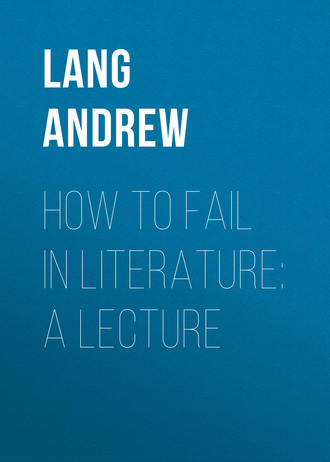
Lang Andrew
How to Fail in Literature: A Lecture
The common novels of Governess life, the daughters and granddaughters of Jane Eyre, still run riot among the rejected manuscripts. The lively large family, all very untidy and humorous, all wearing each other’s boots and gloves, and making their dresses out of bedroom curtains and marrying rich men, still rushes down the easy descent to failure. The sceptical curate is at large, and is disbelieving in everything except the virtues of the young woman who “has a history.” Mr. Swinburne hopes that one day the last unbelieving clergyman will disappear in the embrace of the last immaculate Magdalen, as the Princess and the Geni burn each other to nothingness, in the Arabian Nights. On that happy day there will be one less of the roads leading to failure. If the pair can carry with them the self-sacrificing characters who take the blame of all the felonies that they did not do, and the nice girl who is jilted by the poet, and finds that the squire was the person whom she really loved, so much the better. If not only Monte Carlo, but the inevitable scene in the Rooms there can be abolished; if the Riviera, and Italy can be removed from the map of Europe as used by novelists, so much the better. But failure will always be secured, while the huge majority of authors do not aim high, but aim at being a little lower than the last domestic drivel which came out in three volumes, or the last analysis of the inmost self of some introspective young girl which crossed the water from the States.
These are general counsels, and apply to the production of books. But, when you have done your book, you may play a number of silly tricks with your manuscript. I have already advised you to make only one copy, a rough one, as that secures negligence in your work, and also disgusts an editor or reader. It has another advantage, you may lose your copy altogether, and, as you have not another, no failure can be more complete. The best way of losing it, I think and the safest, is to give it to somebody you know who has once met some man or woman of letters.. This somebody must be instructed to ask that busy and perhaps casual and untidy person to read your manuscript, and “place” it, that is, induce some poor publisher or editor to pay for and publish it. Now the man, or woman of letters, will use violent language on receiving your clumsy brown paper parcel of illegible wares, because he or she has no more to do with the matter than the crossing sweeper. The MS. will either be put away so carefully that it can never be found again, or will be left lying about so that the housemaid may use it for her own domestic purposes, like Betty Barnes, the cook of Mr. Warburton, who seems to have burned several plays of Shakespeare.
The MS. in short will go where the old moons go.
And all dead days drift thither,
And all disastrous things.
Not only can you secure failure thus yourself, but you can so worry and badger your luckless victim, that he too will be unable to write well till he has forgotten you and your novel, and all the annoyance and anxiety you have given him. Much may be done by asking him for “introductions” to an editor or publisher. These gentry don’t want introductions, they want good books, and very seldom get them. If you behave thus, the man whom you are boring will write to his publisher:
Dear Brown,
A wretched creature, who knows my great aunt, asks me to recommend his rubbish to you. I send it by to-day’s post, and I wish you joy of it.
This kind of introduction will do you excellent service in smoothing the path to failure. You can arrive at similar results by sending your MS. not to the editor of this or that magazine, but to some one who, as you have been told by some nincompoop, is the editor, and who is not. He may lose your book, or he may let it lie about for months, or he may send it on at once to the real editor with his bitter malison. The utmost possible vexation is thus inflicted on every hand, and a prejudice is established against you which the nature of your work is very unlikely to overcome. By all means bore many literary strangers with correspondence, this will give them a lively recollection of your name, and an intense desire to do you a bad turn if opportunity arises. 6
If your book does, in spite of all, get itself published, send it with your compliments to critics and ask them for favourable reviews. It is the publisher’s business to send out books to the editors of critical papers, but never mind that. Go on telling critics that you know praise is only given by favour, that they are all more or less venal and corrupt and members of the Something Club, add that you are no member of a côterie nor clique, but that you hope an exception will be made, and that your volume will be applauded on its merits. You will thus have done what in you lies to secure silence from reviewers, and to make them request that your story may be sent to some other critic. This, again, gives trouble, and makes people detest you and your performance, and contributes to the end which you have steadily in view.
I do not think it is necessary to warn young lady novelists, who possess beauty, wealth, and titles, against asking Reviewers to dine, and treating them as kindly, almost, as the Fairy Paribanou treated Prince Ahmed. They only act thus, I fear, in Mr. William Black’s novels.
Much may be done by re-writing your book on the proof sheets, correcting everything there which you should have corrected in manuscript. This is an expensive process, and will greatly diminish your pecuniary gains, or rather will add to your publisher’s bill, for the odds are that you will have to publish at your own expense. By the way, an author can make almost a certainty of disastrous failure, by carrying to some small obscure publisher a work which has been rejected by the best people in the trade. Their rejections all but demonstrate that your book is worthless. If you think you are likely to make a good thing by employing an obscure publisher, with little or no capital, then, as some one in Thucydides remarks, congratulating you on your simplicity, I do not envy your want of common sense. Be very careful to enter into a perfectly preposterous agreement. For example, accept “half profits,” but forget to observe that before these are reckoned, it is distinctly stated in your “agreement” that the publisher is to pay himself some twenty per cent. on the price of each copy sold before you get your share.
Here is “another way,” as the cookery books have it. In your gratitude to your first publisher, covenant with him to let him have all the cheap editions of all your novels for the next five years, at his own terms. If, in spite of the advice I have given you, you somehow manage to succeed, to become wildly popular, you will still have reserved to yourself, by this ingenious clause, a chance of ineffable pecuniary failure. A plan generally approved of is to sell your entire copyright in your book for a very small sum. You want the ready money, and perhaps you are not very hopeful. But, when your book is in all men’s hands, when you are daily reviled by the small fry of paragraphers, when the publisher is clearing a thousand a year by it, while you only got a hundred down, then you will thank me, and will acknowledge that, in spite of apparent success, you are a failure after all. There are publishers, however, so inconsiderate that they will not leave you even this consolation. Finding that the book they bought cheap is really valuable, they will insist on sharing the profits with the author, or on making him great presents of money to which he has no legal claim. Some persons, some authors, cannot fail if they would, so wayward is fortune, and such a Quixotic idea of honesty have some middlemen of literature. But, of course, you may light on a publisher who will not give you more than you covenanted for, and then you can go about denouncing the whole profession as a congregation of robbers and clerks of St. Nicholas.
The ways of failure are infinite, and of course are not nearly exhausted. One good plan is never to be yourself when you write, to put in nothing of your own temperament, manner, character – or to have none, which does as well. Another favourite method is to offer the wrong kind of article, to send to the Cornhill an essay on the evolution of the Hittite syllabary, (for only one author could make that popular;) or a sketch of cock fighting among the ancients to the Monthly Record; or an essay on Ayahs in India to an American magazine; or a biography of Washington or Lincoln to any English magazine whatever. We have them every month in some American periodicals, and our poor insular serials can get on without them: “have no use for them.”
It is a minor, though valuable scheme, to send poems on Christmas to magazines about the beginning of December, because, in fact, the editors have laid in their stock of that kind of thing earlier. Always insist on seeing an editor, instead of writing to him. There is nothing he hates so much, unless you are very young and beautiful indeed, when, perhaps, if you wish to fail you had better not pay him a visit at the office. Even if you do, even if you were as fair as the Golden Helen, he is not likely to put in your compositions if, as is probable, they fall much below the level of his magazine.
A good way of making yourself a dead failure is to go about accusing successful people of plagiarising from books or articles of yours which did not succeed, and, perhaps, were never published at all. By encouraging this kind of vanity and spite you may entirely destroy any small powers you once happened to possess, you will, besides, become a person with a grievance, and, in the long run, will be shunned even by your fellow failures. Again, you may plagiarise yourself, if you can, it is not easy, but it is a safe way to fail if you can manage it. No successful person, perhaps, was ever, in the strict sense, a plagiarist, though charges of plagiary are always brought against everybody, from Virgil to Milton, from Scott to Molière, who attains success. When you are accused of being a plagiarist, and shewn up in double columns, you may be pretty sure that all this counsel has been wasted on you, and that you have failed to fail, after all. Otherwise nobody would envy and malign you, and garble your book, and print quotations from it which you did not write, all in the sacred cause of morality.







